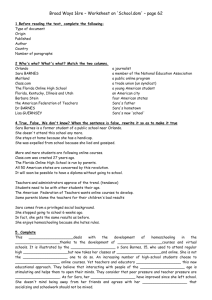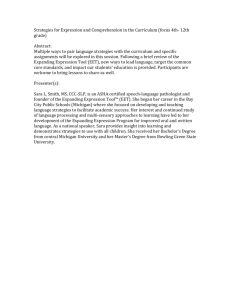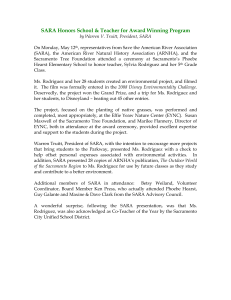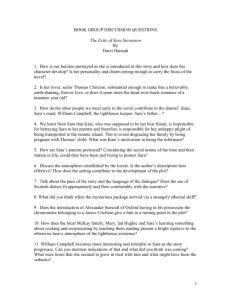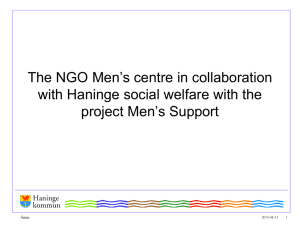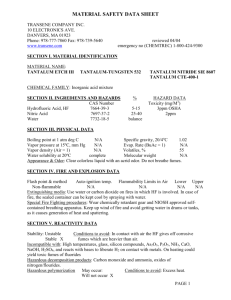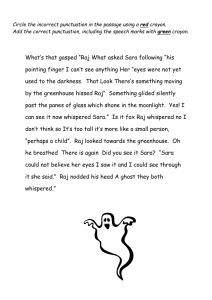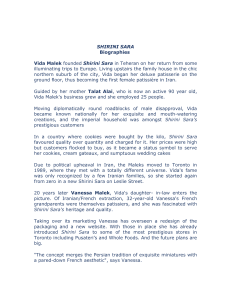FINAL PAP.doc - Tina Yak`s eportfolio
advertisement
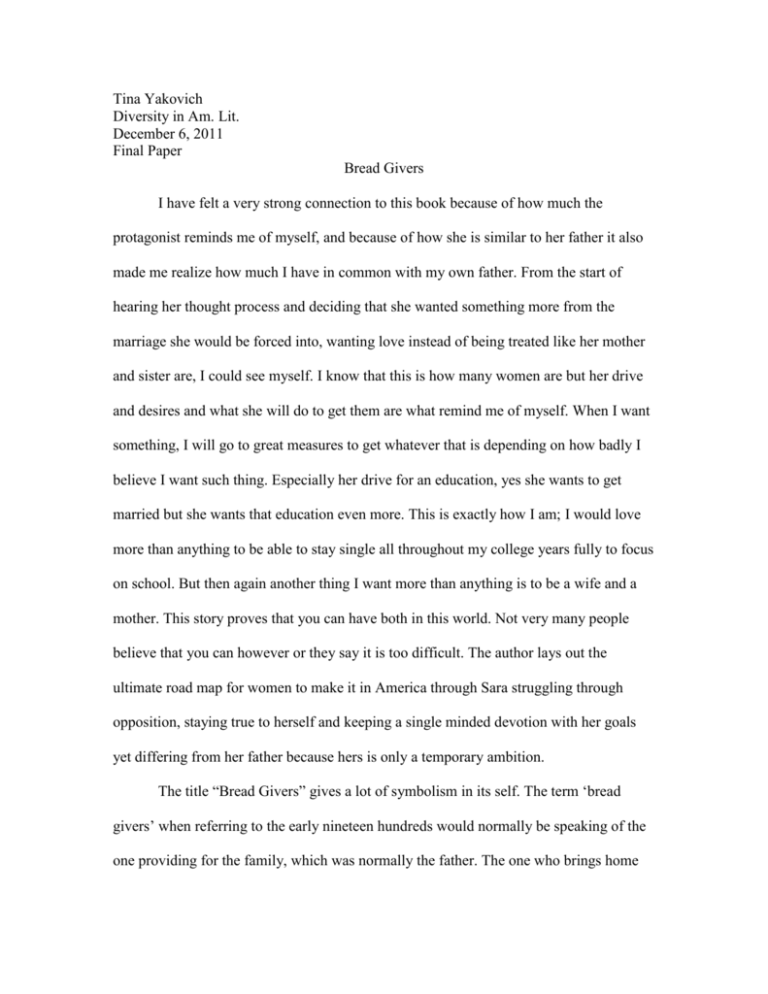
Tina Yakovich Diversity in Am. Lit. December 6, 2011 Final Paper Bread Givers I have felt a very strong connection to this book because of how much the protagonist reminds me of myself, and because of how she is similar to her father it also made me realize how much I have in common with my own father. From the start of hearing her thought process and deciding that she wanted something more from the marriage she would be forced into, wanting love instead of being treated like her mother and sister are, I could see myself. I know that this is how many women are but her drive and desires and what she will do to get them are what remind me of myself. When I want something, I will go to great measures to get whatever that is depending on how badly I believe I want such thing. Especially her drive for an education, yes she wants to get married but she wants that education even more. This is exactly how I am; I would love more than anything to be able to stay single all throughout my college years fully to focus on school. But then again another thing I want more than anything is to be a wife and a mother. This story proves that you can have both in this world. Not very many people believe that you can however or they say it is too difficult. The author lays out the ultimate road map for women to make it in America through Sara struggling through opposition, staying true to herself and keeping a single minded devotion with her goals yet differing from her father because hers is only a temporary ambition. The title “Bread Givers” gives a lot of symbolism in its self. The term ‘bread givers’ when referring to the early nineteen hundreds would normally be speaking of the one providing for the family, which was normally the father. The one who brings home the earnings and protects and takes care of the families. However Sara’s family being immigrants from Poland coming from a heavy Jewish background where it was believed that only a male could read from their holy book the Torah, it was opposite. The young helpless girls of the family had to provide for their family and the father would foolishly spend it or spend it on himself. So in this case the term Bread Givers is referring to the woman, and all they do. Also the insufficient amount male characters took to provide for each of these women. Reb Smolinsky was so absorbed in his religious studies that he wouldn’t take the time to provide for his family and he expected them to provide for him. He would say that, “Women have no brains for the study of God’s Torah, but they could be servants of men who studied the Torah. Only if they cooked for the men, and washed for the men, and didn’t nag or curse the men out of their homes; only if they let the men study the Torah in peace, then, maybe, they could push themselves into Heaven with the men, to wait on them there” (9-10). Reb’s view of woman was very clear because he believed it came from God and anything that came out of the Torah or from God was to be followed no matter what. He spend every waking minute studying the Torah believing that people in America would fall to him and praise it just as he has. Also the husbands Reb chooses for his daughters are quite inadequate themselves. Mashah marries a man who already has children whom he doesn’t take care of. She tries to take care of these children but it has worn her to pieces. She has no opportunity to work because of the four children that were piled on her and the husband doesn’t bring home anything to take care of his family, he spends it all on himself. “We had no sooner finished washing up the dishes when the bread giver came in, smiling, carefree, blowing his chest with pride and pleasure in himself. The sight of his piggish face and new-bought clothes got me so mad…” (149). I thought it was quite interesting how the author wrote his entrance as the “bread giver,” when he is obviously not the definition of a bread giver. He will go out and buy himself new clothes, take himself out to dinner, and buy cigarettes when his wife and children are at home starving away, then he has the nerve to blame it on him. Sara finds this same inadequacy with her school teachers. When she really latches onto psychology she goes to her teacher for more work and more references and he gives her more but when she goes to him and wants to talk about all that she has learned he does not have enough time for her. “‘Ask me any questions. See only how much I’ve just learned.’ ‘I’m late to a class right now. I’m busy with lectures all day long.’ ‘If you’re busy all day, I’ll come to you in the evening. Were do you live?’ he drew back and stared at me. ‘I’m glad to tell you what to read,’ he said, stiffly. ‘But I have no time for recitations outside of class hours. I’m too busy’” (224). Sara had expected to go to college and have the teachers be as into her gaining knowledge as she was. She couldn’t believe that they would not want to take time out of their day to let her show them why she was so proud of every thing she accomplished. Because of these inadequacies these woman would often perish under what these men lacked, however in Sara’s case, this is where she began to fulfill her own needs and make up for all they lacked. Staying true to yourself can be very difficult, you have to be able to sacrifice many things you love and be able to realistically see yourself. A main point the book talks about is the light that emanates from each of the characters. The light that they find within themselves is their very self chosen purpose for living. Everyone in this world has that light, it is what makes you your own person and gives you the most joy. For me it is my religious values but unlike Reb it doesn’t engulf me. It is what gives me motivation to obtain my earthly goals. Reb receives his light from reading the Torah. He has devoted his very soul to reading and studying it, the point where nothing else matters. However this is what he has chosen in his life and it is what makes him shine and you can see it through him when he is speaking from the Torah or about his religious beliefs. His wife, Shenah, I believe is very mistreated. But this is normal for their beliefs and culture. With how much stress this poor woman has and her husband not helping or switching to the American way I am surprised at how well she handles everything. Shenah’s light emanates from when she sees her husband happy. Or when he shows affection towards her. “At Father’s touch Mother’s sad face turned into smiles. His kind look was like the sun shining on her… Her fingers stole a touch of his hand, as if he were the king of the world” (11-12). You can tell that she really loves her husband, and would do a lot for him. She believes in the words he says and holds much respect for her husband. “Mother’s face lost all earthly worries. Forgotten were beds, mattresses, boarders, and dowries. Father’s holiness filled her eyes with light” (16). She finds her light through her husband’s words. She has devoted her life to serving him in every way possible. Sara also has this light. Her light comes from education and achieveing her goals. Because of what she did not recieve from male figures growing up she does not feel the need of it. She believes that she can do it all herself and sets her mind to it. Even though she must leave home to "find herself" she knows that she is chasing her dreams and becoming who she wants to be. Sara knows that education is where she was meant to be. Her determination to make it through college causes this light to come through her. The excitment she gets when she discovers her connection to psychology is proof of how meaningful obtaining knowlege is to her. "I was so excited with the first new book that I stayed up half the night reading it on and on" (223). Sara decided this was her purpose in life. Soon Sara felt a sense of empiness. Like she was missing something in her life. She had achieved the hard goal she'd longed for, and yet she still felt that something was missing in her life. Sara remembered how she felt when she looked upon teachers as a child yet now she couldn't understand why she didn't fell as superior as everyone looked to her. "The goal was here. Why was I so silent, so empty? All labour now-and so far from the light. I longed for the close, human touch of life again" (270). She begans to think about the pricipal, he is the only teacher that she can still see the light a teacher she believed should hold. "There is one in this school who was what I had dreamed to be - the principal, Mr. Hugo Seeling. He had kept that living thing, that flame, that I used to worship as a child. And yet he had none of the aloof dignity of a superior. he was just plain human. When he entered a classromm sunlight filled the place" (270). Because he had this characteristic about him, it caused her to watch him more, and want to be more like him. His specialty was english and when he would come in to help her teach the young children how to pronounce certain words I felt as if she was getting nervous herself with him around. This is when Sara realizes that connection to a human that ever person craves and need to survive. Sara has difficulty trying to developing her own identity stuggling against the opposition from the culture she was brought up in and her own father. She learns that she has to make sacrifices to get what she truly desires. Running away Sara leaves the home she needs. She looses security, somewhere to live and the feeling of saftey you get from a home. Also she has to now provide all for herself instead of a combined effort from her family and her mother making something. A huge deal for her was that she had to sacrafice her family. In most cases family is what holds you up and sends you off to your dreams, people you can trust and only want the best for you. In Sara’s case family is what holds each of them back from getting anything that they really want. She knew she would have to get away to be able to fulfil her dream. By not allowing herself to visit or see her family she was escaping hazerdous obligations her family may come up with to divert her from her soul purpose in life. She couldn’t see them even a second because she could not trust them to not make her feel guilty about leaving. Most of all Sara sacrificed her father’s acceptance. Because Sara was following her dreams of becoming a teacher and fulfiling that goal instead of getting married her father had a problem with it. If she had only of stayed then she would have a husband yet now that is not quite on her mind but she understands that it may not be an option. Sara knows she wants to marry for love, that’s how it is in America. When a fine cannidate came along and showed interest in her it filled the empty spot where she felt she had been craving something. However he did not fit in just how she wanted or needed. He did not have the same connection to worldly things and alo questionined her ability of having her own opinions, she then realized all he filled in was the empty place she had for being wanted and cared for. She showed him that it wasn’t going to work out. Then her father comes and tears her down over the fact of her letting him go, “How could any man love a lawless, conscienceiess thing like you? I never dreamed that a decent man would want to marry you. You had a chance to make a good ending to a bad play, and you push away such a luck match with your own hands… How came you ever to be my child? I disown you. I curse you. May your name and your memory be blotted out of this earth” (208). Sara made many sacrafices in order to find her own identity without her family taking over it. She isolated herself from her family and was willing to give up everything that came with it, including her fathers acceptance. Reb also gave up a lot in order to do what he desired most. However I don’t think he believed he was sacrificing anything. He was just doing what he had always known, putting everything into stuyding the Torah. Which in turn caused him to sacrifice his family, the happiness of each of his children and wife, and his time. This whole time Reb could have been out like a real bread giver of the house and making money for his family and supplying them with what they needed. Also the mother had to sacrafice a lot, mostly she sacraficed her happines for Reb’s. She wanted her chilren to stay on their fathers side and to trust him. When the mother traveled for a few hours she could only stay a few minutes, she knew she needed to be home when the father came home. “It’s lodge night, and your father will be away till late. With all my hurrying it took so long to get here, that I’ll have to go back in a few minutes to be home before he comes” (171). She was going to sacrafice her time to spend with her daughter to keep her husband happy. Sara has amazing determination skills. Even from the beginning when they are given nick names her’s is “Blut und Eisen,” which translates to “blood and iron” where when I picuture someone like blood and iron, I think of a very strong person that can make their way through a lot. Her mother said, “No wonder your father named you ‘Blutund-Eisen.’ When she begins to want a thing, there is no rest, no let-up till she gets it. It wills itself in you to play peddler and waste away the last few cents we got” (20). When she is able to sell quite a bit of herring. This I believe is the part where her entire drive and determination really takes off. As much as Sara tries to pull away from her father, she ends up paralleling him in many noticable ways. Her father studies the Torah in a room by himsef and all he wants is peace and time to himself. When Sara leaves the main thing she is looking for when finding a place to stay is isolation. Finding it she sits alone to study, immersing herself into the studies. Just as her father did. Another moment she has relating to her father was how she viewed teachers. She remembered getting all excited when she was younger to even brush their shoulder as they walked by. She says, “I had it ingrained in me from my father, this exalted reverence for the teacher” (269). Her single minded devotion mimicks her father, however when Sara finds her connection with Hugo, she knows that family is important to her. Her devotion is only temporary and after she achieves her goal she goes back to love and marriage. With all of the similarites between her and her father this is how she pulls away from him, showing that women can have both in this world; gettting and education or career and having a family. The key to Sara’s success was her independence. There are many dangers when it comes to people relying on another to fulfill ones dreams. In this book it always ends up being failed by the other person. When Sara goes to school she is hoping that this love for education and knowledge will help her connect with her father when he disowns her because she wouldn’t marry a perfect sutior in his eyes. Reb also is failed by his new wife, hoping that she will have everything his wife did before him. Instead she just wants him to die so that she can have more money and doesn’t treat him like before. The only dream that is accomplished by the end is Sara’s for an education. Which you can see, relyed only on herself. She made it happen without anyones help. It is good to be dependent on one another but this book clearly shows the hazards of it. The way to accomplishing something is shown through Sara, by staying true to herself and keeping a single minded devotion to what she wants most. Works cited Yezierska, Anzia. Bread Givers. New York: Persea Books, 1925.
